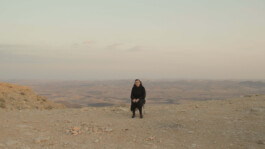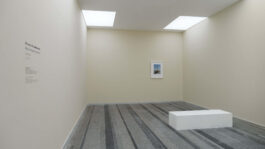
The voice of thine silence
Information
2018, c-print, 45 x 30 cm, framed, sound 3’50”
Courtesy of the Artist
In his work entitled The Voice of the Thin Silence, Karabinovych addresses the tragic history of repressions, deportations, sadness, mourning, and sacrifices through the lens of his family history. The artist’s great-grandfather, an ethnic Greek, was arrested and deported to Kazakhstan in 1949, where he died 5 years later.
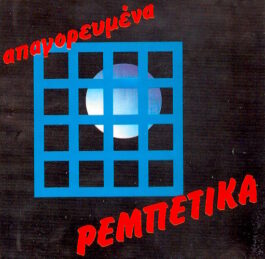
Απαγορευμένα Ρεμπέτικα Νο 1 (Forbidden Rembetika), Cover – Ντόρα Ρίζου, Made By – EMI Greece
The search for information and his father’s memories about his grandfather reminded Karabinovych of “rebetiko,” a Greek music genre that emerged in Athens in the 1930s and is strongly associated with persons relocated from Asia Minor.
In The Voice of the Thine Silence, Karabinovych asked the musician Yuriy Gurzhy to create a rebetiko song, and traveled to the town of Shelek (formerly Chilik) in Kazakhstan to install a symbolic monument to victims of repressions.
The monument is a loudspeaker that broadcasts a piercing mourning song over the silent Kazakh steppe.
«In 1949, explains Nikolay Karabinovych, «my great-grandfather, a Greek, was repressed and deported to Kazakhstan. I heard a lot of stories about this from my father, who had never known him, and only knew the story from the recollections of his mother. My father had always wanted to go to the grave of his grandfather, and I decided to go with him.» Such are the biographical circumstances that called this work to life, its creation being an event in the biography of its author and, in turn, an event that became part of his work.
The first step was a collaboration with the Berlin musician Yuriy Gurzhy, whom the artist asked to compose a song in the peculiar rebetiko style that developed in Greece in the 1920s and 1930s, after the so-called Asia Minor Catastrophe (the genocide of the Pontic and Anatolian Greeks).
He then went on a trip to Kazakhstan, to the village of Shelek (Chilik), where deported Greeks, Chechens and Germans have lived since the Second World War. On its outskirts, he installed a loudspeaker on a solitary column, from which Yuriy Gurzhy’s song sounded in the middle of the silent steppe.
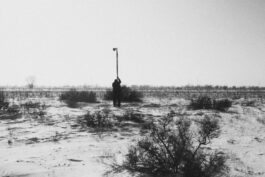
The voice of thin silence. 2018 Analog black and white photo on Baryta paper
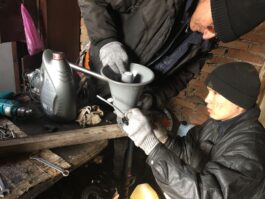
Installation process, custom made loudspeakers system, 2018
Karabinovych gave a significant title to his work, one which harks back to the Old Testament, to the 1st Book of Kings. In it, «the still, small voice of calm» spoke to the prophet Elijah on Mount Sinai in the form of a «gentle breeze», which, of course, is nothing but the voice of God speaking with him in silence.
However, this event was preceded by three others – at first there was a wind of unprecedented power, that «rent the mountains, and brake in pieces the rocks», then an all-shaking earthquake, and then everything began with an all-consuming fire.
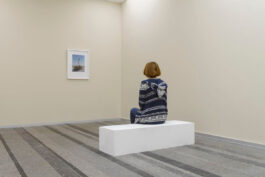
Installation view, PinchukArtCentre Kyiv, 2018
All three divine phenomena – as the theologians claim – are correlated with the three hypostases of spiritual experience, by which the wind is wilful aspiration to divine indulgence, the earthquake is the trepidation and thrill of its expectation, and fire embodies the flame of love, which is the innermost essence of the divine.
The whole theological construction forms into a single circle of catastrophe, heavy trials, passions and enlightenment, where the latter is impossible without the previous three hypostases. Such is the theology of the event and its structure.
An event, however, is an extraordinary phenomenon. Once it has taken place in the life of a person or of mankind, it irrevocably determines the subsequent course of life for an extended period, becoming a reference point by which we define ourselves while shaping the present. Remaining faithful to such great revolutions or immense dramas (the Holocaust, deportations, genocides), we save them from oblivion, and we retain the ability to learn lessons from them.
At the same time, as Alain Badiou wrote, «fidelity is both fidelity to the event and fidelity to oneself as a subject – if the subject ceases to interrogate a situation, he ceases to exist.» Therefore, «the still, small voice of calm», i.e. the voice of silence, can be heard only by one who «has reached silence within himself.» Therefore, fidelity to the event presupposes spiritual discipline and external rituals. This is why Nikolay Karabinovych made a pilgrimage to the village of Chilik and left his mark there – a trace of loyalty to the place and the event that took place there.
Viktor Misiano
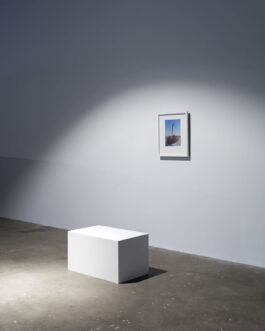
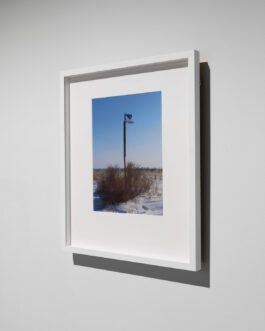
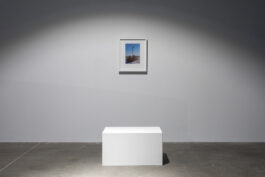
Exhibitions
2023 Freiburg, Delphi Space
2023 Dublin, Green on red gallery
2021 Pärnu, Linnagaleriis Raekojas
2019 Kmytiv, Museum of Soviet art
2019 Bratislava, Hit Gallery
2018 Moscow, Jewish Museum
2018 Kyiv, PinchukArtCentre
Related texts
On the voice of thine silence by Yevgenia Belorusets (EN)
ФОТОГРАФІЯ У МОЛОДОМУ УКРАЇНСЬКОМУ МИСТЕЦТВІ by Iлля Романенко(UA)
Zapovit by John C Welchman (EN)
Press
Special Thanks
Yuriy Gurzhy, Uros Petković

